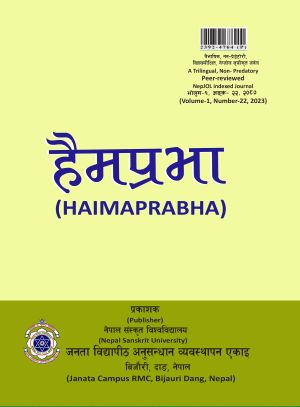Reasons for the Prevalence of Caste Discrimination and Practice of Untouchability in Itihāsko Ek Piakā and Likhe
DOI:
https://doi.org/10.3126/haimaprabha.v1i22.56546Keywords:
Caste discrimination, emancipation, hierarchy, untouchable, Verna systemAbstract
This paper examines reasons for the prevalence of caste discrimination and practice of untouchability in Itihāsko Ek Piakā and Likhe. To fulfill the objective, the researcher has implied Stuart Hall's theory of representation under cultural studies as main and other theorists' insights are cited as supporting tools to analyze and interpret the primary texts. This study is primarily a library based qualitative research. The area of this research is confined to novels by both Dalit and non-Dalit Nepali writers. The data were collected from text information, description and record keeping. The researcher found that all the Dalit characters have been facing socio-economic, educational, political and cultural domination, discrimination, humiliation and biasness from the upper caste people in the words and actions. The representation of Dalit characters displays that due to the policy of the nation results the caste discrimination and practice of untouchability. These evil socio-cultural practices result: illiteracy, poverty, unemployment, lack of political access, lack of unity among Dalits and lack of self-esteems. Beside this, characters in both novels: Bhuwansingh and Likhe suffer by same childhood experiences in terms of discrimination and untouchability. These evil socio-cultural practices also affect the learning environment. Thus, Dalits have been suffering lifelong and searching their self-respect and humanly treatment to emancipate them. This study adds new avenue for academic discussion in the field of academia so as to address the age-long discriminatory system in order to create a just and healthy society without any forms of discrimination in the name of race, class caste, color and gender. Therefore, it is significant to the academia because it is a great asset.
Downloads
Downloads
Published
How to Cite
Issue
Section
License
Copyright (c) 2023 Nepal Sanskrit University, Janata Campus, RMC, Bijauri Dang, Nepal

This work is licensed under a Creative Commons Attribution 4.0 International License.
© Nepal Sanskrit University, Janata Campus, RMC, Bijauri Dang, Nepal

